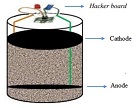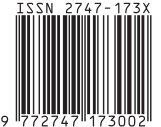Effect of Fructose and Butyric Acid Addition during Electricity Production in Single Chamber Microbial Fuel Cell
DOI:
https://doi.org/10.19184/cerimre.v6i1.38255Keywords:
Substrate, Fructose, Butyric acid, Power density, Microbial Fuel CellAbstract
The substrate is an important factor for efficient electricity production in Microbial Fuel Cell systems. The substrate is an organic compound that promotes the growth of active microbes. The goal of this study was to investigate the effect of substrate type and concentration on the bioelectricity produced by a single-chamber MFC. Fructose and butyric acid were used as substrates and carbon felt used as an electrode. Types and variations in substrate concentration were applied to the soil media used in the MFC. After 3 weeks of incubation, the optimum power density value achieved by MFC with 90 g/L fructose substrate was 20.5 mW/m2. Whereas, MFC treated with 800 mg/L butyric acid produced a maximum power density of 19.7 mW/m2.
Keywords: Substrate, Fructose, Butyric acid, Power density, Microbial Fuel Cell.








